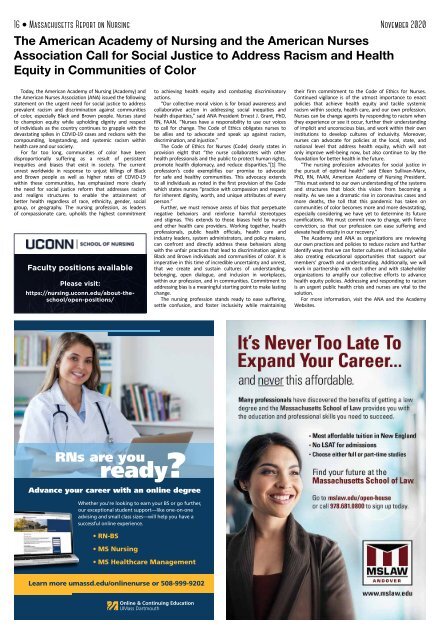Massachusetts Report on Nursing - December 2020
You also want an ePaper? Increase the reach of your titles
YUMPU automatically turns print PDFs into web optimized ePapers that Google loves.
16 • <str<strong>on</strong>g>Massachusetts</str<strong>on</strong>g> <str<strong>on</strong>g>Report</str<strong>on</strong>g> <strong>on</strong> <strong>Nursing</strong> November <strong>2020</strong><br />
The American Academy of <strong>Nursing</strong> and the American Nurses<br />
Associati<strong>on</strong> Call for Social Justice to Address Racism and Health<br />
Equity in Communities of Color<br />
Today, the American Academy of <strong>Nursing</strong> (Academy) and<br />
the American Nurses Associati<strong>on</strong> (ANA) issued the following<br />
statement <strong>on</strong> the urgent need for social justice to address<br />
prevalent racism and discriminati<strong>on</strong> against communities<br />
of color, especially Black and Brown people. Nurses stand<br />
to champi<strong>on</strong> equity while upholding dignity and respect<br />
of individuals as the country c<strong>on</strong>tinues to grapple with the<br />
devastating spikes in COVID-19 cases and reck<strong>on</strong>s with the<br />
compounding, l<strong>on</strong>gstanding, and systemic racism within<br />
health care and our society.<br />
For far too l<strong>on</strong>g, communities of color have been<br />
disproporti<strong>on</strong>ally suffering as a result of persistent<br />
inequities and biases that exist in society. The current<br />
unrest worldwide in resp<strong>on</strong>se to unjust killings of Black<br />
and Brown people as well as higher rates of COVID-19<br />
within these communities, has emphasized more clearly<br />
the need for social justice reform that addresses racism<br />
and realigns structures to enable the attainment of<br />
better health regardless of race, ethnicity, gender, social<br />
group, or geography. The nursing professi<strong>on</strong>, as leaders<br />
of compassi<strong>on</strong>ate care, upholds the highest commitment<br />
Faculty positi<strong>on</strong>s available<br />
Please visit:<br />
https://nursing.uc<strong>on</strong>n.edu/about-theschool/open-positi<strong>on</strong>s/<br />
to achieving health equity and combating discriminatory<br />
acti<strong>on</strong>s.<br />
“Our collective moral visi<strong>on</strong> is for broad awareness and<br />
collaborative acti<strong>on</strong> in addressing social inequities and<br />
health disparities,” said ANA President Ernest J. Grant, PhD,<br />
RN, FAAN. “Nurses have a resp<strong>on</strong>sibility to use our voices<br />
to call for change. The Code of Ethics obligates nurses to<br />
be allies and to advocate and speak up against racism,<br />
discriminati<strong>on</strong>, and injustice.”<br />
The Code of Ethics for Nurses (Code) clearly states in<br />
provisi<strong>on</strong> eight that “the nurse collaborates with other<br />
health professi<strong>on</strong>als and the public to protect human rights,<br />
promote health diplomacy, and reduce disparities.”[1] The<br />
professi<strong>on</strong>’s code exemplifies our promise to advocate<br />
for safe and healthy communities. This advocacy extends<br />
to all individuals as noted in the first provisi<strong>on</strong> of the Code<br />
which states nurses “practice with compassi<strong>on</strong> and respect<br />
for inherent dignity, worth, and unique attributes of every<br />
pers<strong>on</strong>.”<br />
Further, we must remove areas of bias that perpetuate<br />
negative behaviors and reinforce harmful stereotypes<br />
and stigmas. This extends to those biases held by nurses<br />
and other health care providers. Working together, health<br />
professi<strong>on</strong>als, public health officials, health care and<br />
industry leaders, system administrators, and policy makers,<br />
can c<strong>on</strong>fr<strong>on</strong>t and directly address these behaviors al<strong>on</strong>g<br />
with the unfair practices that lead to discriminati<strong>on</strong> against<br />
Black and Brown individuals and communities of color. It is<br />
imperative in this time of incredible uncertainty and unrest,<br />
that we create and sustain cultures of understanding,<br />
bel<strong>on</strong>ging, open dialogue, and inclusi<strong>on</strong> in workplaces,<br />
within our professi<strong>on</strong>, and in communities. Commitment to<br />
addressing bias is a meaningful starting point to make lasting<br />
change.<br />
The nursing professi<strong>on</strong> stands ready to ease suffering,<br />
settle c<strong>on</strong>fusi<strong>on</strong>, and foster inclusivity while maintaining<br />
their firm commitment to the Code of Ethics for Nurses.<br />
C<strong>on</strong>tinued vigilance is of the utmost importance to enact<br />
policies that achieve health equity and tackle systemic<br />
racism within society, health care, and our own professi<strong>on</strong>.<br />
Nurses can be change agents by resp<strong>on</strong>ding to racism when<br />
they experience or see it occur, further their understanding<br />
of implicit and unc<strong>on</strong>scious bias, and work within their own<br />
instituti<strong>on</strong>s to develop cultures of inclusivity. Moreover,<br />
nurses can advocate for policies at the local, state, and<br />
nati<strong>on</strong>al level that address health equity, which will not<br />
<strong>on</strong>ly improve well-being now, but also c<strong>on</strong>tinue to lay the<br />
foundati<strong>on</strong> for better health in the future.<br />
“The nursing professi<strong>on</strong> advocates for social justice in<br />
the pursuit of optimal health” said Eileen Sullivan-Marx,<br />
PhD, RN, FAAN, American Academy of <strong>Nursing</strong> President.<br />
“This must extend to our own understanding of the systems<br />
and structures that block this visi<strong>on</strong> from becoming a<br />
reality. As we see a dramatic rise in cor<strong>on</strong>avirus cases and<br />
more deaths, the toll that this pandemic has taken <strong>on</strong><br />
communities of color becomes more and more devastating,<br />
especially c<strong>on</strong>sidering we have yet to determine its future<br />
ramificati<strong>on</strong>s. We must commit now to change, with fierce<br />
c<strong>on</strong>victi<strong>on</strong>, so that our professi<strong>on</strong> can ease suffering and<br />
elevate health equity in our recovery.”<br />
The Academy and ANA as organizati<strong>on</strong>s are reviewing<br />
our own practices and policies to reduce racism and further<br />
identify ways that we can foster cultures of inclusivity, while<br />
also creating educati<strong>on</strong>al opportunities that support our<br />
members’ growth and understanding. Additi<strong>on</strong>ally, we will<br />
work in partnership with each other and with stakeholder<br />
organizati<strong>on</strong>s to amplify our collective efforts to advance<br />
health equity policies. Addressing and resp<strong>on</strong>ding to racism<br />
is an urgent public health crisis and nurses are vital to the<br />
soluti<strong>on</strong>.<br />
For more informati<strong>on</strong>, visit the ANA and the Academy<br />
Websites.

















